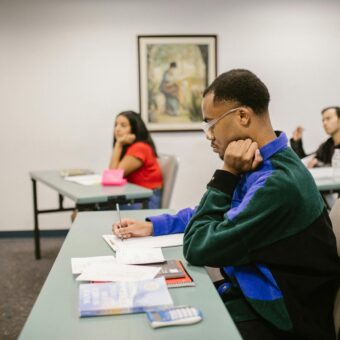
Image: Unsplash and FSB Marketing
By Kunal Chan Mehta Article Date: 19th July 2021
90.48% of FSB’s final year students are satisfied with their overall experience at FSB, according to the 2021 National Student Survey (NSS). This is above the 75.4%sector average for overall satisfaction.
Across the Higher Education section, the annual result of the National Student Survey reflects the sector’s commitment to the very highest standards of learning, teaching and overall student experience.
This year’s student survey absorbed the hit of the pandemic where students were transitioned to online learning – conceivably not the student experience anyone hoped for. But, at FSB, our academic, professional and support services worked assiduously to deliver the best learning and teaching experience possible.
‘I am delighted that our NSS 2021 student satisfaction score is 90.48 per cent which is a credit to our staff. But there is always more we can all do. The past pandemic year has been a steep learning experience for everyone,’ said Mr Mohammed Zaidi, FSB’s Deputy CEO. ‘I am deeply aware of the hardship this year has created for our students and staff. However, the FSB community has remained resilient and continues to listen, learn, reflect and act on feedback.’
Student experience is everything
Despite unparalleled challenges due to the pandemic, FSB set a precedent for taking student satisfaction incredibly seriously during the initial lockdownand measured the satisfaction of its students from core aspects, such as the image of FSB, expectations, perceived quality and value.
Asked about the NSS data concerning learning opportunities, where FSB scored an astonishing 92.86% for courses offering opportunities for exploring ideas, Mr Mohammed Zaidi added: ‘As soon as a student steps into any FSB campus, we work in partnership with them to support, coach and mentor them. This works well with our students personally, academically, as a nexus, and professionally. Further, I am extremely grateful to the OfS and its NSS survey that allows us to know what works, what we need to improve and where to take action.’
Dr John Pomeroy, FSB’s Principal, added: ‘The fact that FSB obtained a 90.48% satisfaction rating from our students in the 2021 National Student Survey is a tribute not only to the staff who have made it possible but also to the students who have embraced our philosophy of them being partners with us in the education process. Despite the pandemic and how this has affected our students who are adult returners to education (average age of 34) and the family and other responsibilities this has entailed, the result is a testament to the dedication of the staff in adapting to new conditions and of the students who have positively responded to it.’
Investing in student mental health and wellbeing services
Dr Wendy Wigley, FSB’s Head of Student Lifecycle, said: ‘We became acutely aware at the start of the pandemic that this was going to have a significant impact on our student population. We quickly took action and mobilised, ‘reach out’ to all students, particularly those with known vulnerabilities. Our student support teams were on call to assist students with access to online classes, assist with IT literacy, and ensure all students with a declared disability were in receipt of Disabled Students Allowances (DSAS).’
‘As we look ahead to welcoming students back on campus, we are thrilled that FSB increased its investment in student support functions with additional support for those students facing hardship while expanding mental health and wellbeing support throughout all student support services. These services all, expectedly, enhance student satisfaction.’
FSB thanks its students who shared their feedback with this year’s National Student Survey during major lockdowns while studying online. The feedback permits enhancement to be made for the benefit of current and prospective students and staff.
FSB’s full results are publicly available on the Office for Students website.
Please email the author of this article kunal.mehta@fairfield.ac for any further questions or comments.
